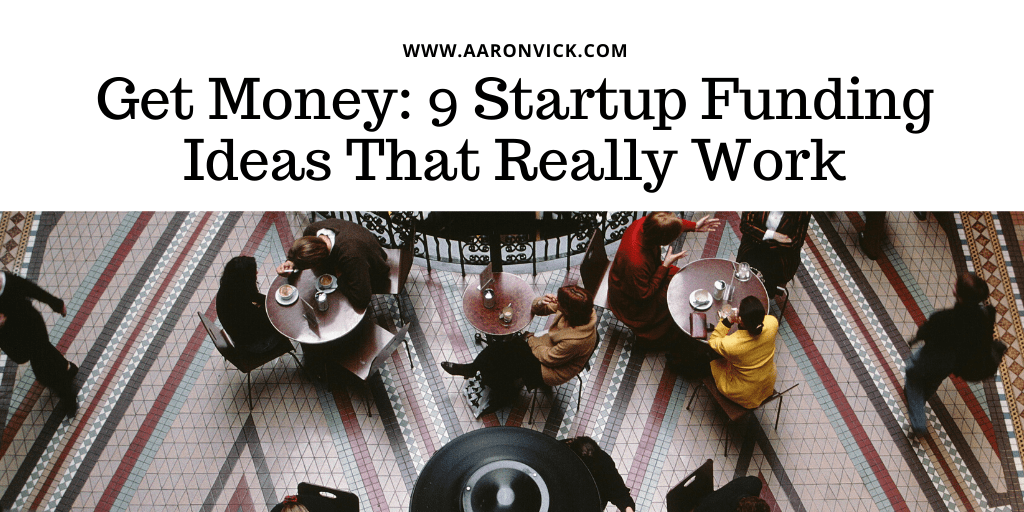Get Money: 9 Startup Funding Ideas That Work
For everyone that has a great business idea, startup funding is usually the barrier to the next step. You might be stuck in how to raise the money to get your brilliant business idea started. You can’t have your idea successfully grow until you have some sort of funds.
1. Friends and Family
A classic way to start a business is to borrow money from friends and family. Convincing friends and family to believe in your dream is sometimes easier than convincing an investor or a bank. Friends and family might be more willing to fund your company if you have a clear direction of what you’ll be doing with your money and your milestone goals laid out for them.
If you are borrowing the money as a loan make sure you have a clear understanding and written agreements that outline when and how the money will be repaid. The last thing you want to do is allow borrowing money to ruin your relationships with friends and family.
2. Incubators & Accelerators
An incubator and accelerator provide workspace, business training, business advice, and potential funding to groups of startups. They are near colleges that have a strong business program. Normally these groups are sponsored by universities and industry organizations.
Startups get support from the sponsor and they also get to network with other startups. The incubator sometimes will take an equity stake in the startup as well. Keep in mind that incubators are usually focused on tech-heavy businesses.
3. Barter
Although many businesses prefer to be paid in cash there are some willing to trade. You can look for small businesses that can fulfill one of your needs and that you have a solution for something they need to be fulfilled.
You can agree to do an exchange for your website built or google ads just to name a few.
4. Crowdfunding
If you’re great at generating buzz on social media then this might be the option for you. Websites that businesses have used to fund their startup have included Indiegogo, and Kickstarter to name a couple.
There are many startups that use crowdfunding to raise their funds so it helps to offer an incentive to those that contribute. Those that contribute don’t receive equity in your business and they aren’t entitled to be repaid either.
Keep in mind crowdfunding isn’t regulated by the Federal Securities and Exchange Commission.
5. Equity Crowdfunding
This is another crowdfunding option where it’s similar to regular crowdfunding except that you seek small investments from many investors. The investors, in this case, become shareholders in your company, unlike traditional crowdfunding.
This type of crowdfunding is an option thanks to Jumpstart Our Business Startups (JOBS) Act. This is a regulated securities offering where you want to carefully review everything on their site for requirements and all the legalities.
6. Bootstrapping
This is a very common way of getting a startup going. It means using your own funds to run your business. Some people use their own savings, 401K, credit cards, or mortgage line of credit.
If you seek investors in the future they will like to see that you are also financially invested in your own idea. Many startup founders will hold off on paying themselves, in the beginning, to demonstrate to future investors their own commitment.
7. Venture Capitalist
Some startups seek help from a venture capitalist which are professional investors that invest in startups and growing companies. Before seeking a venture capitalist you more than likely need to be past the first stages of building your business.
Most venture capitalists invest $1 million or more and it can take months to close the deal. When going this route you have to make sure that your business interested are aligned with the venture capitalist you’re seeking.
Keep in mind that venture capitalist have control over your company and idea. If you want to follow your own vision this might not be the best option for you.
8. Small Business Grants
Private organizations and the government have free funding available for certain startups. There are certain criteria you will have to meet such as being in the education field, medical field, or your business has to be engaged in something great for society.
Grants are offered to small businesses that are run by women, veterans, and minorities. There are local SBA chapters that can help you if you’re looking for local grant money.
9. Licensing / Partnership
You might have a product that will go hand in hand with someone that you can create a partnership or a licensing deal if they can benefit from the product. If you have a great product you have the option of marketing it independently and risk it not reaching enough people or you can go this route and find a manufacturer that would love to use your product in one of their models.
These are great for startups with a physical product.
Now Go Raise Money Like a Pro
With the list above with different ways to raise startup funding for your new idea, you can get started right away. As you can see there are ways to make sure that your ideas are heard by informed investors.
If you’re looking for more guidance on creating your startup contact me today.
